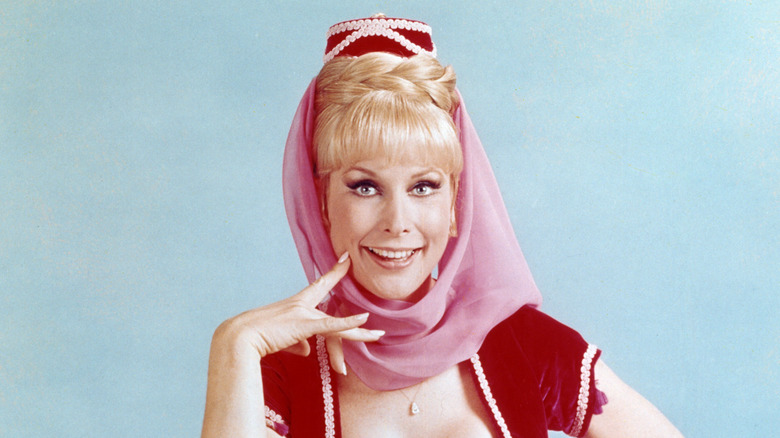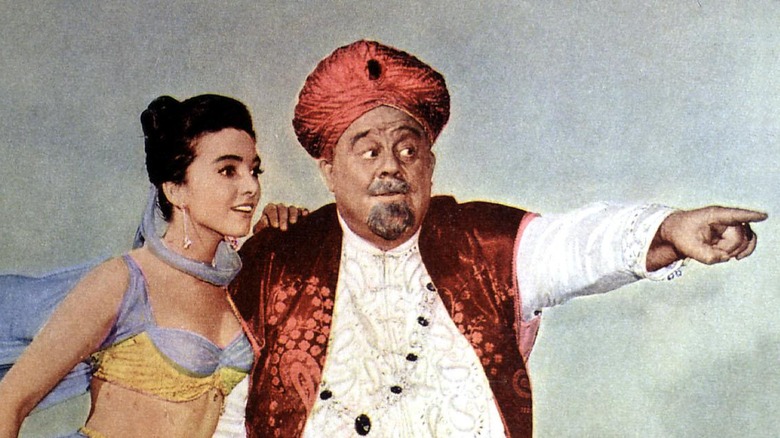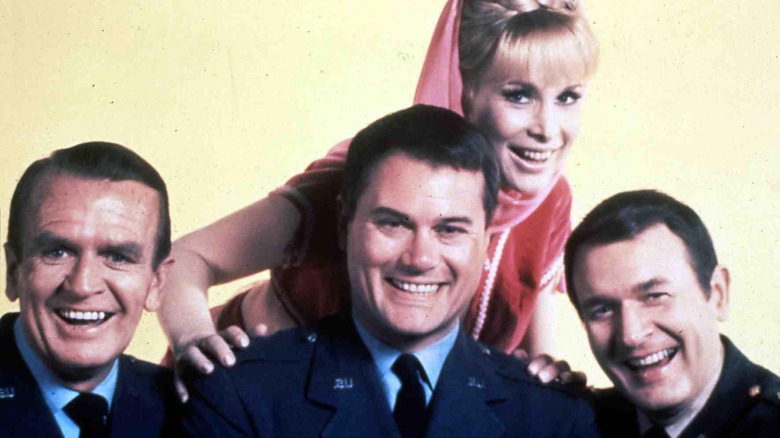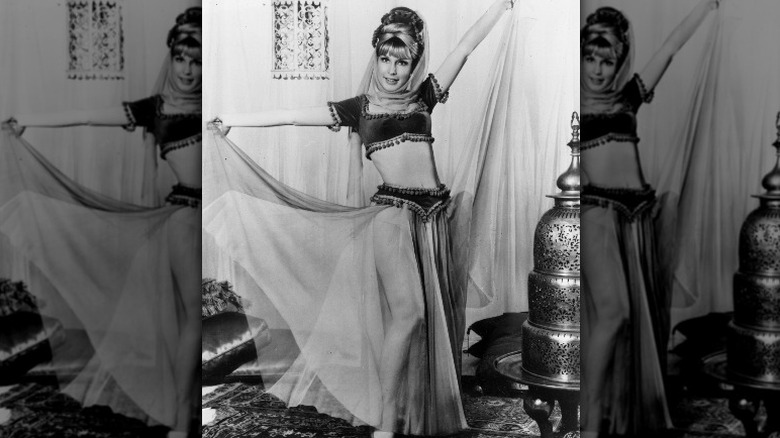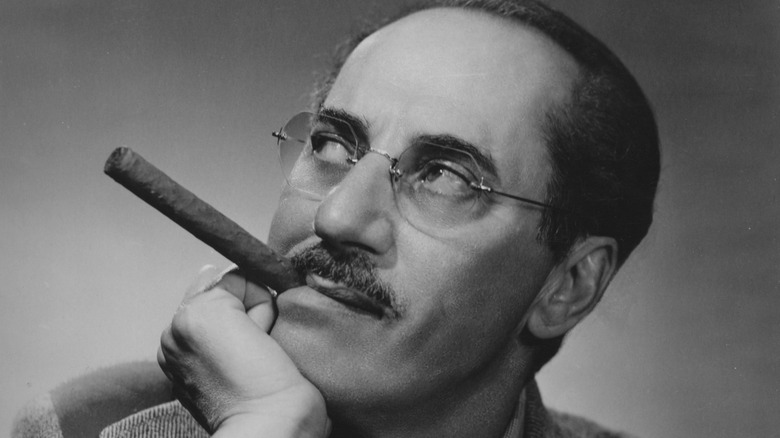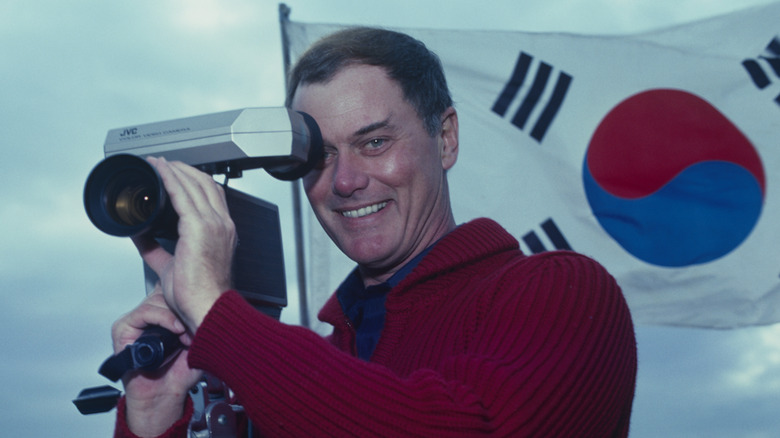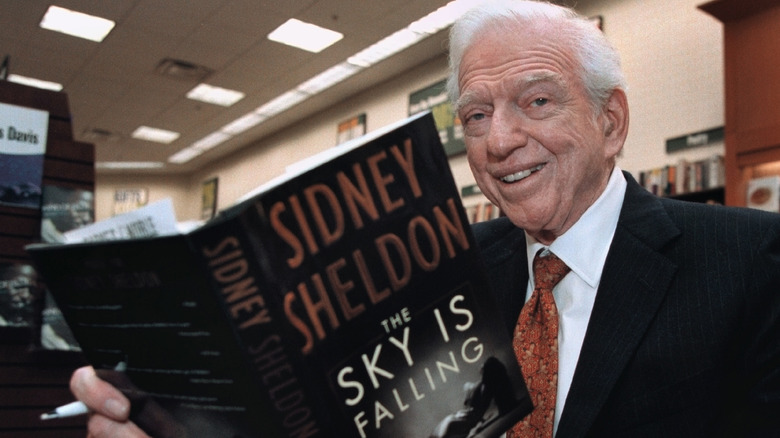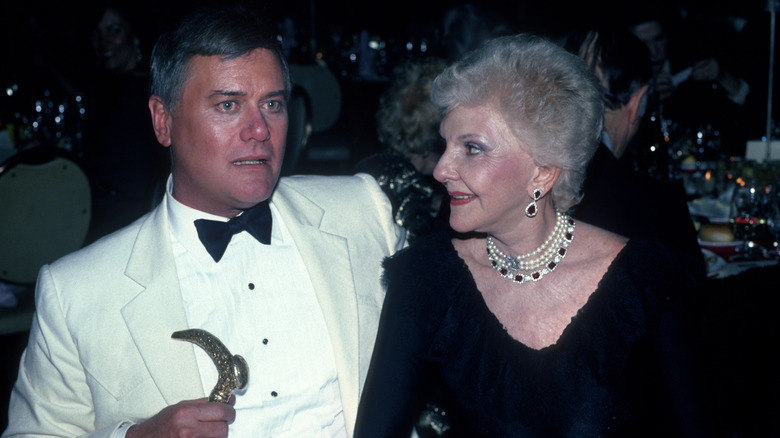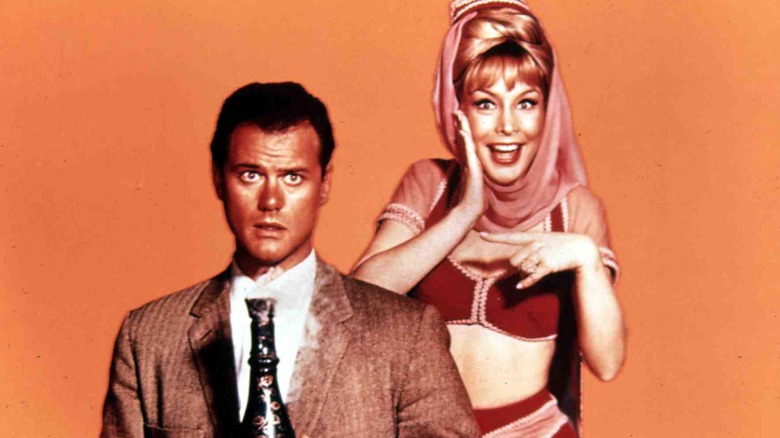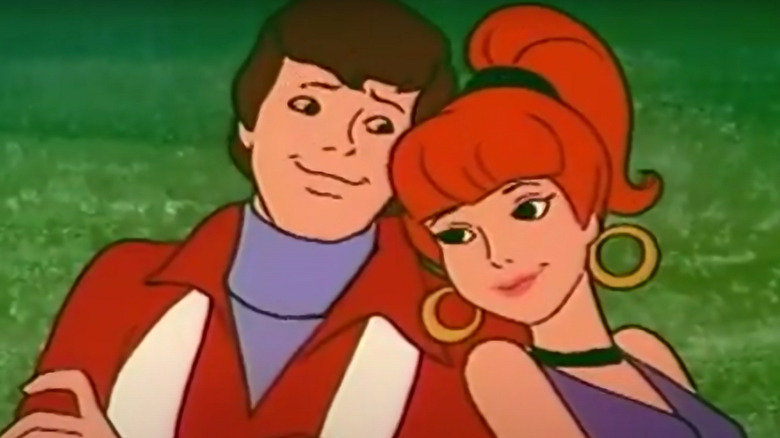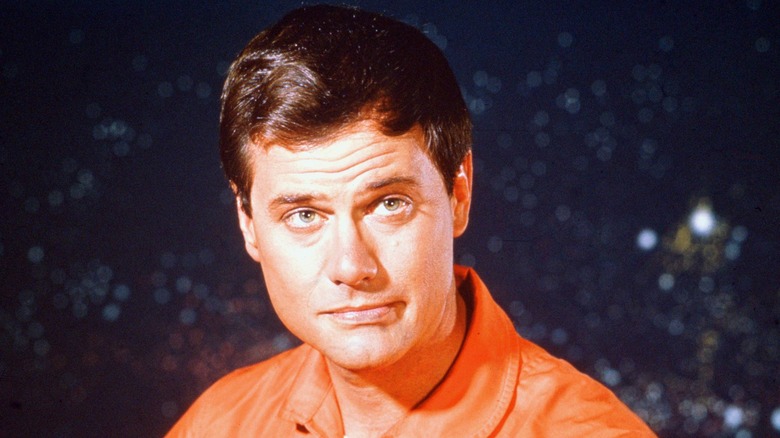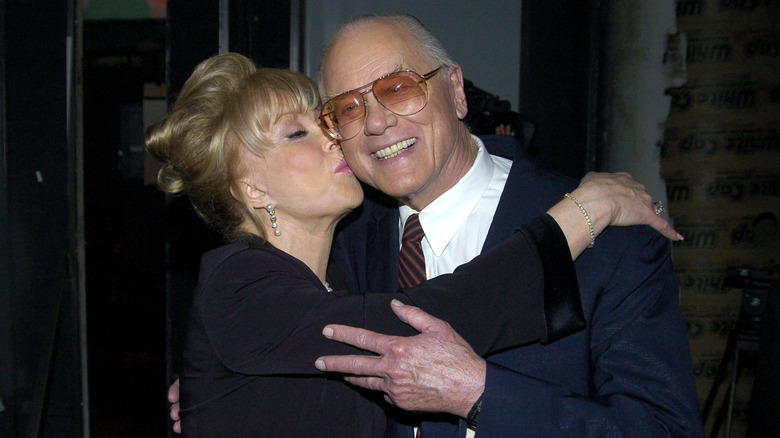The Untold Truth Of I Dream Of Jeannie
Call them jinn, djinn, or genie — the conception of these spirits from Arabian folklore has come a long way from initial notions of mercurial, often destructive beings. Modern generations are more likely to picture genies not unlike Disney's big blue wisecracker with the voice and energy of Robin Williams. But television had softened the ground decades earlier with its own comic, benevolent genie. Across five seasons, Barbara Eden offered up laughs of her own as the star of "I Dream of Jeannie," the continuing misadventures of a lovesick genie who insists on helping her master, NASA major Tony Nelson. Whether she knows how to help, or whether he wants any, is beside the point.
Debuting on NBC in 1965, "I Dream of Jeannie" was the yin to "Bewitched's" yang. Both shows were produced by Screen Gems (albeit for different networks), and both featured beautiful and well-intentioned blondes with magical powers who leave havoc in their wake. Julia Harari of Collider has argued that "Bewitched" carried a more pointed commentary on family and diversity in 1960s America, and so has more staying power; other critics have found "Jeannie" comparably subversive. For many viewers, the two were just fun. And "Jeannie's" production and afterlife came with some fun and strange episodes of their own.
It was sparked by an obscure fantasy movie
"I Dream of Jeannie" was created by TV veteran Sidney Sheldon. For inspiration, Sheldon looked to a film he had seen in 1964. Starring Burl Ives and Tony Randall, "The Brass Bottle," adapted from a novel by Thomas Anstey Guthrie, tells the story of a put-upon architect (Randall) who comes across an antique bottle. Convinced it's a fake, he decides against giving it to his fiancée's father, only to discover that the bottle holds an ancient and affable genie (Ives). Said genie is so grateful to be released that he insists on turning his master's life around, to near-disastrous results.
According to Rebeat, "The Brass Bottle" was met with an anemic reception by audiences and critics in 1964. The film was produced by Universal Studios, which was undergoing a regime change, and may have suffered from being caught in transition. It has picked up a few fans over the years, but Sheldon's refashioning of the basic idea with a young, vivacious female genie has long since outshone his inspiration. Besides the premise, Sheldon also took Barbara Eden from the film; she played Randall's fiancée.
Curiously, an earlier comedy had already brought audiences a gorgeous genie with a penchant for mischief decades before "I Dream of Jeannie." "A Thousand and One Nights" in 1945 featured Evelyn Keyes as Babs, Aladdin's lovesick magical servant. And like Jeannie, Babs gets her man in the end, though not quite in the standard fairy tale ending.
The pilot was nearly derailed by line issues
In his memoir "The Other Side of Me," Sidney Sheldon had plenty to say, good and bad, about the creation and production of "I Dream of Jeannie." In preparing the initial pilot, he got things off to a good start. The now-iconic animated opening was put together by Friz Freleng (although it wasn't used again after the pilot until episode 9), the requisite genie bottle was converted from a Jim Beam decanter, and the initial rehearsals had gone off without a hitch. On the day filming began, Sheldon went to his office, confident that all was well. And it was — until director Gene Nelson called, threatening to quit.
Sheldon rushed to the set to see what was the matter. Nelson told him that two of the series leads, Larry Hagman and Bill Daily, didn't know their lines. Furious, Sheldon confronted his actors, but the truth was a little more complicated. Daily, a veteran comic used to nightclubs and improvisation, was unused to scripted television. In Hagman's case, he knew his lines; he just wanted to embellish them, despite voicing his approval of the script along with the rest of the cast at the last readthrough.
Sheldon was still unhappy. The tight schedule of TV production didn't allow room for actors to ad-lib. He told Hagman to stick to the script, he arranged for Daily to get tapes of his dialogue to help with memorization, and he convinced Nelson to stick it out through the pilot. Things soon got back on track.
Jeannie's navel wasn't the only note the censors had
A favorite anecdote of the cast and crew of "I Dream of Jeannie" is that the censors didn't allow Barbara Eden to show her navel as Jeannie. 1960s television could only handle so much midriff, or so select members of the press thought. But Sidney Sheldon was facing questions about the sexual content of "I Dream of Jeannie" well before the series needed a wardrobe department.
In his memoir "The Other Side of Me," Sheldon wrote that he was so raring to go on the pitch for "I Dream of Jeannie" that he dictated an entire script instead of an outline. It went over well at Screen Gems, who brokered a deal with NBC almost immediately. Once Sheldon's script reached the network executives, however, trouble started brewing. Some of the staff at NBC felt the concept only amounted to one real joke. More seriously, the standards and practices department found the idea of a beautiful genie in a two-piece outfit living with her single male master scandalous. An 18-page memo from the department laid out various conditions, including a prohibition against Jeannie and Major Nelson from so much as touching one another.
Sheldon cited contemporary sitcoms with similarly broad concepts to get around the one-joke complaint and told NBC chief Mort Werner that he wasn't planning a sexually charged program. But the rules about touching were ignored from the very first episode.
A guest star was paid with a TV set
"I Dream of Jeannie" featured numerous guest stars in the course of its run, some of them titanic figures in 1960s pop culture. Sammy Davis Jr. made an appearance on the show, though he and Larry Hagman had a somewhat tense relationship between takes. Comedians like Don Rickles and Milton Berle popped in and out, as did veteran character actors like Jim Backus. Some of these guests appear regrettable with hindsight; Phil Spector appeared in Season 3 when he was still a record producer, long before his conviction for the murder of Lana Clarkson.
No such specter clouds Groucho Marx's cameo on the series. And he wasn't hard to get. He and "Jeannie" creator Sidney Sheldon were friends. Sheldon wrote in his memoir "The Other Side of Me" that Marx called him one day, complaining about the quality of talent on the show. "I know a guy who would be great," Marx said. "He's young and handsome and brilliant." When Sheldon asked who this mystery actor was, Marx replied, "Who else? Me."
Marx made a brief appearance in the episode "The Greatest Invention in the World," written a week after his call to Sheldon. He worked without pay, or at least without cash. As compensation, Sheldon gave Marx a color TV.
Larry Hagman got to direct as a consolation prize
For all the laughs it brought to viewers, "I Dream of Jeannie" wasn't the happiest experience for its male lead. As the son of famed Broadway star Mary Martin, Larry Hagman had a chip on his shoulder about his own notoriety with the public. He resented not being the true star of "I Dream of Jeannie." This, at least, is how Sidney Sheldon described the situation in his memoir "The Other Side of Me." To hear Hagman tell it to the Archive of American Television, he wanted the show to be as good as it could be and was prepared to argue for better scripts. His behavioral issues were to do with drugs, not ego.
Hagman complained that episodes of "I Dream of Jeannie" kept recycling the same four basic plots and that his efforts to recruit more writers went unheeded. While he was talked down from a threat to leave the series after the third season, he did appeal to the head of Screen Gems, Jackie Cooper. If he had to keep doing the same scripts, said Hagman, he wanted two things: more money and a chance to direct some episodes. "It helped me a lot, directing," Hagman told the Archive, "because then you learn a different perspective about the overall picture."
Sidney Sheldon took away some of his own credits
The person who creates a TV show isn't always responsible for running it day to day, or for writing scripts. But Sidney Sheldon, who produced the pilot script for "I Dream of Jeannie" in short order, was its writer-producer. His deal with Screen Gems granted him his own production company under their name to manage the show. For a time, he worked two shows at once, flying from "Jeannie" production duties in Los Angeles to a job as story editor of "The Patty Duke Show" in New York (per the Archive of American Television).
Besides managing "I Dream of Jeannie's" production, Sheldon wrote a lot of episodes, 38 in a row during the second season by his own count in "The Other Side of Me." Credits are vital to screenwriters getting work, but Sheldon grew self-conscious about the number of times his name appeared on "I Dream of Jeannie's" credit sequence. To work around this, Sheldon invented three pseudonyms and cleared their use with the Writers Guild.
The nepotism of sons and mothers in casting
Retirement isn't for everyone, and for elderly parents who like to keep busy, it can pay to have a son with his own TV show. Sidney Sheldon's mother, Natalie Marcus, was in her 80s but still active in a dress shop by the time Sheldon created "I Dream of Jeannie." While visiting her son in Los Angeles, Marcus was recommended by Sheldon's wife for a small part in an episode about a séance, despite Marcus having no background in acting. After actress Queenie Smith was cast in another small part, Sheldon decided to give Smith the lines originally intended for his mother and wrote new lines for her. But according to his memoir "The Other Side of Me," when she got her new lines, the heretofore unexperienced actress objected to the material. "My character would never say this," she insisted. Marcus got her lines back, Smith got a rewrite, and the shoot went well.
When he heard that Marcus was making a cameo, Larry Hagman kiddingly accused Sheldon of nepotism. Sheldon replied that Hagman's mother, famed actress Mary Martin, was welcome to make her own appearance. Martin never did appear on "I Dream of Jeannie," but she did request to see the pilot before it aired while Sheldon was in New York. Her comments alternated between high praise for Screen Gems' sales department to waspish contempt for the same.
Major Nelson worked at NASA because it was funnier
Why exactly is Major Tony Nelson an astronaut in "I Dream of Jeannie?" It's not as if there's any ancient connection between the djinn of Middle Eastern folklore and the scientific study and exploration of outer space. Even with the premise of the series being a 20th century government man saddled with an overeager genie, there were more established civilian and military agencies to choose from. When the Archive of American Television asked Sidney Sheldon why he went with NASA, he had a simple answer for them: "I thought NASA was more up-to-date [and] funnier." It was essential to the show's comedy, he reasoned, that Tony Nelson be obligated to a strict, square, uneccentric code of conduct that Jeannie could disrupt.
NASA proved cooperative with "I Dream of Jeannie" throughout its run, though Sheldon said that he didn't need to do much convincing. "I'm not sure we had much to do with them in the beginning," he told the Archive. The agency exerted no pressure on Screen Gems over the show's scripts and raised no objections to filming background plates on-site. Many of its staff became fans of the show as it went on. Sheldon was invited to NASA's headquarters at one point, and several real-life astronauts served as extras when Jeannie and Nelson married in the fifth season.
No one wanted Jeannie and Tony to get married
In the fifth and final season of "I Dream of Jeannie," Jeannie and Major Tony Nelson tied the knot. The decision to get the two of them hitched was made by NBC, and the network brass were the only ones happy about it. "I tried to explain," series creator Sidney Sheldon told the Archive of American Television, "that what kept the show going was the sexual tension between the characters, and that when they were married, that sexual tension would be gone." Barbara Eden told the Archive that she didn't like the idea. Larry Hagman was sure the show couldn't work once they were married. And Bill Daily felt it completely changed the premise.
Against all this opposition, NBC had a ready retort: no marriage, no fifth season. And so Sheldon and his cast reluctantly married Jeannie and Nelson off. The fifth season proved the last for "I Dream of Jeannie," and Sheldon and Daily both blamed the network's ultimatum for the show's demise (Eden didn't speculate on the reasons for cancellation in her Archive interview). "I Dream of Jeannie" wasn't the only popular series of the time to have a marriage coincide with its end; "Get Smart" suffered the same fate.
When Jeannie met Luke Skywalker
A number of sitcoms from the 1960s had animated spin-offs the following decade. With the concepts of so many sitcoms of the era trending towards fantasy and broad, cartoony comedy, it was perhaps a fitting development. But Hanna-Barbera's "Jeannie" bore little resemblance to its inspiration when it premiered in 1973. None of the original cast returned to voice their characters, most of whom didn't appear at all. Only Jeannie herself returned, and she was almost unrecognizable, having red hair and Julie McWhirter's voice. Her new master and love interest was Corey Anders, a teenage beach bum with a like-minded sidekick, and Jeannie herself had a sidekick in the form of genie-in-training Babu.
According to Jeff Lenburg's "The Encyclopedia of American Animated Television Shows," the radical shift in "Jeannie's" concept was due to the target audience; "I Dream of Jeannie" was made for adults, while the cartoon was made for children and teenagers. The series gave a young Mark Hamill his first work as a voice actor, several years before he became known as Luke Skywalker in "Star Wars." But Lenburg names Babu as the audience favorite, at least for the two brief years "Jeannie" was on the air.
Larry Hagman found out the show was canceled from a security guard
"Lowly actors never know what's going on upstairs." So said Barbara Eden in an interview with the Archive of American Television, when asked why "I Dream of Jeannie" was canceled at the end of its fifth year. She and the rest of the cast had no sway with NBC to affect the show's renewal or cancellation, nor were they given a specific reason for why it wasn't picked up for a sixth season. But in Larry Hagman's case, the lack of word from on high was so total that he and his agent weren't even told the show had ended.
In Hagman's interview with the Archive, he said that he went on vacation to South America to visit his mother after the end of "I Dream of Jeannie's" fifth season, a trip that lasted around a month. While he suspected the show wasn't going to last once his character and Eden's were married, he expected some sort of formal notice whenever things wrapped up. When he returned to Los Angeles, Hagman needed to fetch a few things from his studio dressing room. It was only when he reached the gate that he learned the series had ended, courtesy of the security guard.
Barbara Eden's guest appearance on Dallas was full of nods to Jeannie
Like other sitcoms of its era, "I Dream of Jeannie" continued on after its cancellation with reunions, TV movies, and appearances by the cast on talk shows. Larry Hagman took part in none of these. In her memoir "Jeannie Out of the Bottle," Barbara Eden claimed that Hagman had communicated to her in no uncertain terms that he wanted to put as much distance between the show and himself as possible. He'd moved on to the starring role of J.R. Ewing in the soap opera "Dallas" and was quite happy to be the leading man of his own series.
Eden had a short recurring role on "Dallas" as Lee Ann, a former lover of J.R.'s, and she worried about Hagman's reaction to being reunited with her on-screen. It didn't help that her costume in her first scene was pink. But when Hagman first saw her before the cameras, he made a joke about traveling back in time, and he and Eden got along fine during filming. By accident or design, Eden's run on "Dallas" was full of apparent nods back to "I Dream of Jeannie" beyond the pink suit.
Hagman eventually began appearing at conventions and on talk shows in association with "I Dream of Jeannie," with and without Eden. The two of them would act together again on the stage, in a production of "Love Letters."
